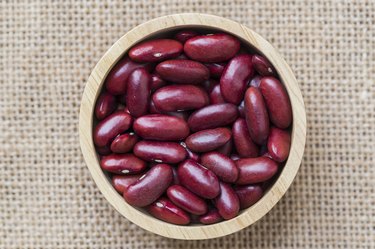
Soaking kidney beans the night before you plan to make a pot of chili or minestrone is a common practice that ensures tasty, tender beans the next day. Don't worry, though, if you forget to soak the beans overnight. A quick soak in hot water the following day is just as effective.
Power Soak
Video of the Day
If you forget to soak kidney beans the night before, another option is the power soak. This method uses boiling water to accelerate the softening process. Rinse the kidney beans and sort through them, removing any rocks or field debris. Place the clean beans in a heavy pot and fill the pot with water so that the water sits 2 to 3 inches above the beans. Heat the pot to boiling over medium-high heat and boil for three minutes. Remove the pot from the heat and let it sit for two to four hours. Drain the water, rinse the beans and cook as usual.
Video of the Day
Seasoning
Once you've power soaked and rinsed the beans, put them in a pot or slow cooker and cover them again with 2 to 3 inches of water. Simmer them on low until they are tender. Remember, though, to delay seasoning them until they are thoroughly cooked. Adding garlic, celery or onions is fine, but salt, lemon juice, tomatoes or other acidic or salty seasonings will toughen the beans.
Benefits
Kidney beans will soften eventually without soaking, but soaking serves several purposes. It reduces cooking time and improves the flavor. More importantly, soaking kidney beans removes some of the enzymes and sugars that causes intestinal upset.
Considerations
Dried beans have a long shelf life, although older beans take longer to cook and require more water. Discard any dried beans older than two years, according to Beth Hensperger, co-author of "Not Your Mother's Slow Cooker Cookbook." Fresh and canned kidney beans do not require soaking. Rinse them and proceed with cooking.